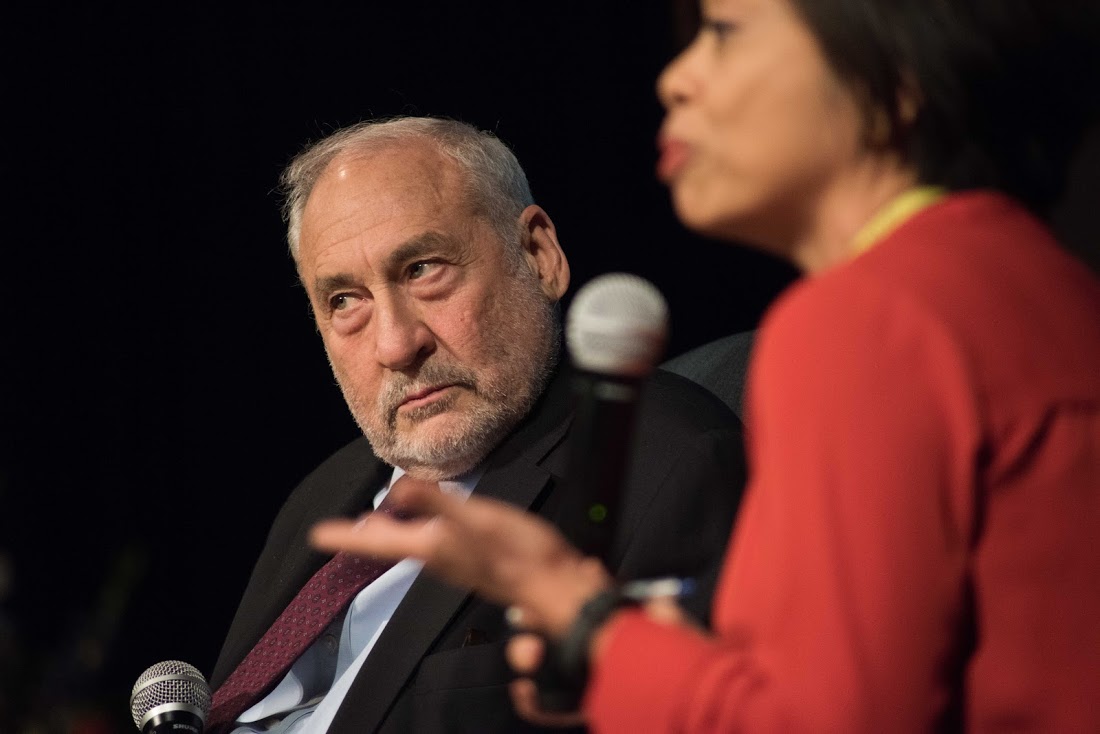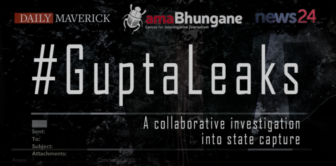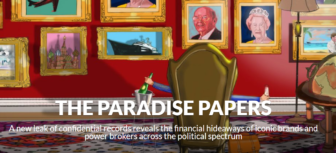
Nobel Prize-winning economist Joseph Stiglitz in conversation with Professor Sheila Coronel at #GIJC17. Photo: Madeleine Cronje
The #GuptaLeaks is a big South African story, but it should be as big a story in the United States, the United Kingdom and in India.
Joseph Stiglitz, speaking at the GIJN closing keynote address last night in a packed Wits University Great Hall in Johannesburg, joined the dots to illustrate the global reach of the Gupta scandal.
The story begins with the brothers from Saharanpur, India, who arrive in South Africa to go on to allegedly “capture” the South African President Jacob Zuma and people in his family and political circle. The plot thickens to include the Guptas’ connection with international companies including Bell Pottinger, McKinsey and KPMG, all implicated in unscrupulous and damning practices in the work they carried out for the Guptas.
 In the last few months, journalists in South Africa have mined thousands of leaked emails to reveal the tainted thread that binds them all. Their digging has revealed a PR campaign to create deeper racial division in the country as a diversionary tactic, it also shone a glaring spotlight on the failure by transnational corporates to act responsibly or to take full accountability when they’ve been caught out.
In the last few months, journalists in South Africa have mined thousands of leaked emails to reveal the tainted thread that binds them all. Their digging has revealed a PR campaign to create deeper racial division in the country as a diversionary tactic, it also shone a glaring spotlight on the failure by transnational corporates to act responsibly or to take full accountability when they’ve been caught out.
It’s added to uncertainty in the country and with it the downward spiral of the rand and the prospect of yet another credit rating downgrade in the next few weeks.
“There’s a lack of transparency in government and corporations because they don’t want people to know. Secrecy is at the core of how they operate,” said Stiglitz, who was in conversation with Sheila Coronel, director of the Stabile Center for Investigative Journalism and professor at Columbia University.
The Nobel Prize-winning American economist said the complicity of companies and governments in propping up a culture of non-disclosure is widespread and global, pointing a finger to the president of his own country and calling up in particular Donald Trump’s refusal to make public his tax returns. He also took aim at tech giant Apple’s infamous tax dodge revealed in August last year.
It’s the kind of corruption that will keep investigative journalists working today busy for another 50 years, he joked to the room of over 1000 journalists from over 120 countries.
Stiglitz said journalists could always do more and should continue digging deeper and doing more investigations. He commended the recent work of journalists, who through relentless digging and collaborative efforts were able to bring the world the exposes of the Panama Papers and the Paradise Papers. As the secrets of the offshore paradises for the world’s super-wealthy have been exposed, it given hope for reform, said Stiglitz, albeit something that he said would only come about in the long-term.
But reporting matters, good journalism matters, as Stiglitz pointed out that offshore havens for “growing money in the sun” keeps the concentration of wealth in hands of the 1 percent of super wealthy and represents money leaving countries robbed of revenue and taxes meant for education, or hospitals or better sanitation and roads.
Africa’s illicit financial flows have for some time exceeded the amount of money the continent receives in foreign direct investment and foreign aid, Stiglitz added.
“An oil company may pay a bribe to a president to be allowed to drill and they appropriate these natural resources for themselves. When they send their money to these offshore fiscal paradises that are about secrets and non-disclosure, it deprives countries of the benefits they should be receiving,” said Stiglitz.
He joined even more dots: as countries have fewer resources and increased economic pressure, the gulf between rich and poor widens. And, the greater the dissatisfaction among the economically disempowered, the more fertile the ground to sprout right-wing extremism and fascism.
Understanding the deep consequences of inequalities was at the heart of Stiglitz ad his colleagues George Akerlof and Michael Spence’s Nobel Prize in Economics Sciences in 2001.
Stiglitz said that consequently, the rise of populism, lead by the “threat of Trump and his alternative facts” takes the world back to a time before the Enlightenment.
“Its deepest threat is that it destroys our belief in truth,” he said.
Stiglitz played the economist’s Delphic hand when asked by Coronel to gaze into his crystal ball to see what next in a world that she said swirls with threats of growing autocracy and populism.
“Economists never predict the future because we always get it wrong,” he joked, then added: “Investigative journalisms may have no market value but it is done in the public good. I believe that with good journalism also with individual citizens and foundations and trusts committed to democracy, we will be able to pull back from the brink to reach a new progressive era.”
Watch the full keynote address below:
 Ufrieda Ho is an independent journalist based in Johannesburg. She is author of Paper Sons and Daughters.
Ufrieda Ho is an independent journalist based in Johannesburg. She is author of Paper Sons and Daughters.

